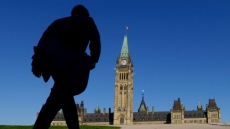OTTAWA — A third front has opened up in the war between the NDP and rival parties over the allegedly improper use of parliamentary resources — this time involving questions about partisan activity in taxpayer-funded constituency offices.
Dozens of New Democrat MPs have been using their constituency offices as staging grounds for door-to-door canvassing blitzes, dubbed "days of action."
New Democrats say they're simply doing what MPs are supposed to do: talking to constituents about the issues of the day.
But Conservatives and Liberals suspect the blitzes are really about promoting NDP incumbents and identifying supportive voters in advance of this fall's federal election.
Consequently, they believe New Democrats may be violating parliamentary rules which forbid any partisan activities in MPs' riding offices, including "activities related to a member's re-election."
NDP MPs already stand accused of misusing parliamentary resources to pay for mass partisan mailings and staff in satellite party offices, for which the board of internal economy has ordered them to reimburse almost $4 million.
New Democrats maintain they're the victims of a partisan gang-up by Conservative and Liberal members of the secretive board, which polices House of Commons spending. The NDP is challenging the board's rulings in court.
Nevertheless, they may yet have to defend their use of constituency offices. Conservative MP Randy Hoback said the board "definitely" needs to look at the matter, which he sees as another example of the NDP "flouting the rules."
"It still comes down to the basic rule: you can't use taxpayers dollars for partisan activities."
Arguably, any time MPs meet with constituents, they are promoting — directly or indirectly — their re-election hopes and their parties. But Hoback said care must be taken to avoid any sign of partisanship in riding offices, where constituents of all party stripes are supposed to feel welcome.
A partisan aura does seem to surround the NDP's days of action.
In a video pitch late last year, NDP national campaign director Anne McGrath explained how the days of action were integral to the party's goal of building "the largest field organization program in NDP history" in order to win the coming election.
"It is built on the foundation of talking to voters, neighbour to neighbour on the doorstep," she says, boasting about results so far and adding that more days of action "are now scheduled to keep building our ground campaign."
A sample questionnaire used during day of action canvasses, provided by the NDP, asks constituents if their MP is on the right or wrong track and which party best represents their interests in Parliament.
In notices for day of action events in their ridings last October, 27 NDP MPs gave their constituency office addresses as the gathering point. Another 27 did likewise for a day of action in February.
A notice for a "community canvass" earlier this month with Toronto MP Peggy Nash similarly lists her constituency office as the starting location. Tweeted photos show Nash posing inside and outside her office with supporters holding campaign signs emblazoned with her name.
Nash makes no apologies for the numerous door-to-door blitzes she's organized to talk to her constituents about pressing issues, from child care to climate change.
"I'm really proud of the kind of work that we've done reaching out to our constituents," she said.
"I usually say, "Is there anything that's top of mind for you and here's some of the things that I've been working on.' ... To me, that's the job of the MP (to be) connecting with your constituents."
Nash said she encourages volunteers to canvass with her and if some carried campaign-style signs last month — which she doesn't remember — that's probably just a reflection of their "enthusiasm."
The Liberals have also organized days of action but the party maintains none have made use of constituency offices.
Notices posted for upcoming Liberal days of action show most events are hosted by candidates in ridings the party currently doesn't hold. Many are using their campaign headquarters, as they are entitled to do.
Liberal MP Adam Vaughan held a day of action in his downtown Toronto riding earlier this month and he says his volunteers met at a coffee shop.
"It's impossible not to have a conversation about the election while you're in a constituency office with people you've worked with politically. They're going to happen and I don't think we need to be silly about this," Vaughan said.
"But using the office to stage a riding event, to bring the riding association into the constituency office or to use the equipment provided to you by the government to manage your constituency files, they're not to be used to manage or produce or create a platform for election activity. Period."
A senior NDP source said it's absurd to suggest that MPs shouldn't allow volunteers to gather on a cold day for coffee in a constituency office before heading out on a door-to-door canvass.
But at least one NDP MP has used his constituency office as a gathering place for a more overtly partisan event. Mike Sullivan used his Toronto office earlier this month to gather supporters for a bus ride to a downtown rally with NDP Leader Tom Mulcair.





